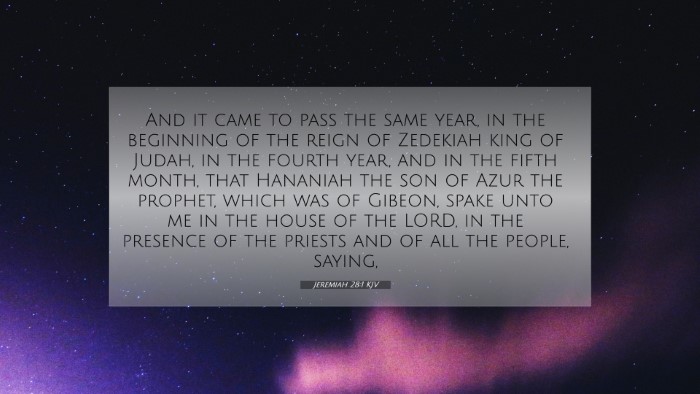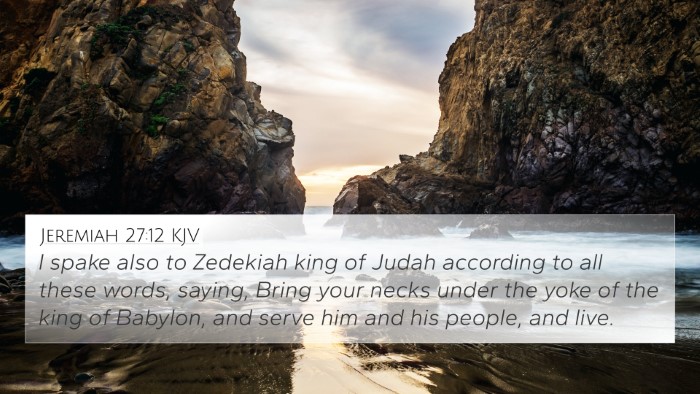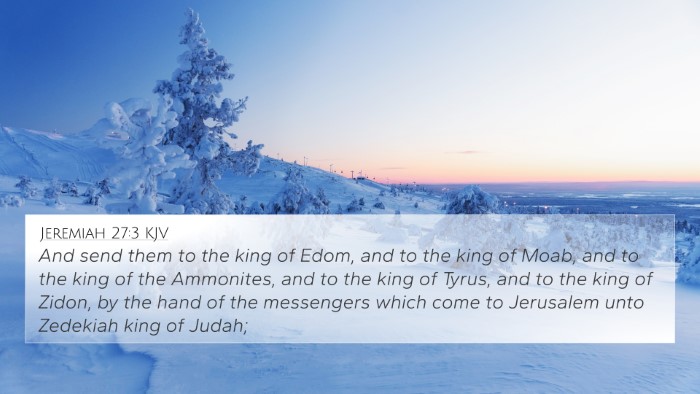Understanding Jeremiah 28:1
Verse: Jeremiah 28:1
In the year that King Zedekiah reigned over Judah, in the fourth year, and in the fifth month, Hananiah the son of Azur, the prophet, who was of Gibeon, spoke unto me in the house of the Lord, in the presence of the priests and of all the people, saying.
Contextual Background
Jeremiah 28:1 sets the stage for a significant prophetic confrontation during a tumultuous period in Judah's history. In this verse, we see the introduction of Hananiah, a prophet opposing Jeremiah, which encapsulates the broader themes of authenticity in prophetic voices and the contrasting messages regarding Judah’s fate. Jeremiah focuses on God’s truth, while Hananiah represents a hopeful but ultimately misleading narrative.
Commentary Insights
The insights from Matthew Henry, Albert Barnes, and Adam Clarke on Jeremiah 28:1 emphasize the following:
- Matthew Henry: Henry notes the significance of the contextual setting and the authority by which Hananiah speaks. He highlights the conflict between true and false prophets, underscoring a recurring biblical theme.
- Albert Barnes: Barnes elaborates on the identity of Hananiah, suggesting his role as a pivotal figure who misled the people with comforting yet false prophecies. He emphasizes the importance of discernment in prophetic messages.
- Adam Clarke: Clarke points to the implications of this prophetic encounter, illustrating how it demonstrates the tension between human expectations of peace and God’s sovereign plans for judgment and exile.
Thematic Connections and Biblical Cross-References
This verse presents a variety of connections and parallels within scripture:
- Jeremiah 23:16-18: A warning against listening to false prophets who claim peace without divine mandate.
- Deuteronomy 18:20-22: God's instruction on discerning the truth of a prophet's word based on its fulfillment.
- Isaiah 28:15: A critique of those who make a covenant with death and seek assurance from falsehood.
- Micah 3:5: God's judgment upon false prophets who lead His people astray for personal gain.
- 2 Corinthians 11:13-15: The New Testament warning about false apostles who disguise themselves as servants of righteousness.
- Ezekiel 13:6-9: A rebuke of false prophets who have misled God’s people through peace-promoting falsehoods.
- Matthew 24:24: A prophetic concern about many false prophets arising in the last days, deceiving many.
Applications and Reflections
As we analyze Jeremiah 28:1 alongside these themes and cross-references, several critical lessons emerge:
- Discernment: Believers are called to discern between true and false teachings and to remain grounded in the word of God.
- The Role of Prophets: The role of prophetic voices in scripture serves as a reminder of the importance of alignment with God’s truth.
- Hope vs. Reality: This passage evokes reflection on the correlation between human desires for peace and God’s plan, which may involve discipline and trial.
Conclusion
Jeremiah 28:1, paired with the insights from public domain commentaries, highlights the necessity of understanding prophetic messages within their contextual framework. The scripture not only warns against false prophecies but also stresses the imperative to do thorough comparative Bible verse analysis for a deeper understanding of God’s plans and promises. Engaging in cross-referencing Biblical texts enriches our grasp of interconnected themes in scripture, enhancing our study of God's word.












